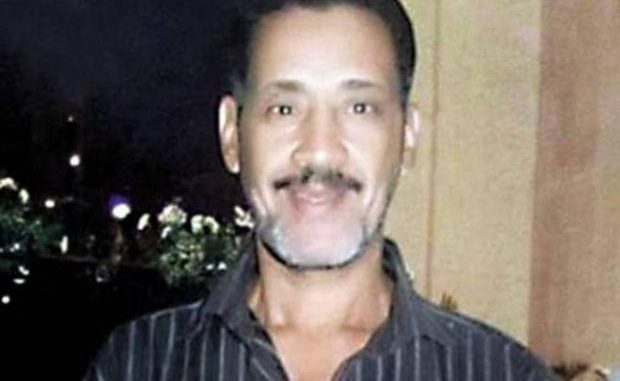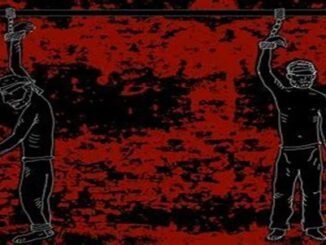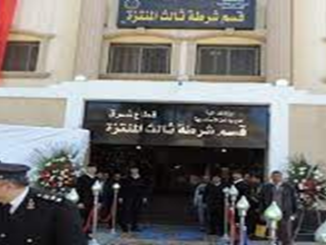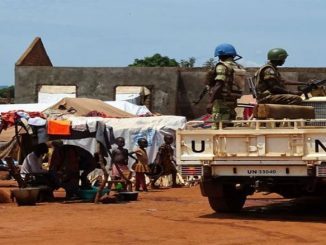
A Coptic Christian was allegedly tortured to death by the Egyptian police forces. The photographs of Makeen’s tortured body have been circulating on social media.
Makeen was allegedly tortured by about 10 police officers at Al-Amiriya police station after being arrested on 13 November while driving a cart with two of his friends.
On 14 November, Makeen’s family found out about his death and decided to transfer the body to Al-Zaytoun hospital, where they found signs of assault and torture on his body.
Makeen’s family accused the Egyptian police for torturing Makeen to death.
Two men, who had been with Makeen the day before, informed the family of the details.
They said they were with Makeen as he drove his horse cart. He accidentally hit a police car that was passing by. The police officer in the car, Captain Karim Magdy, shouted obscenities at Makeen who retaliated by shouting back insults. The verbal fight escalated; Makeen drove away to escape the police, but they caught him and took him and the two other men who were with him to the police station of al-Amiriya.
They said that Makeen died after two hours of brutal torture.
On the other hand, the police narrated a different story saying that the three men on the horse cart were selling drugs and the police officers were chasing them. The police car hit the horse cart during the chase and Makeen lost his life. The police said they found 2000 tablets of narcotics on the cart.
Yusri Attiya, Makeen’s cousin, said that “Makeen was a very poor man.” “Could a drug dealer be so poor? He always enjoyed a good reputation among his neighbors and all who knew him. But all this is beside the point; if Makeen was a drug dealer he should have been prosecuted according to the law, not tortured to death.”
The incident spread on social media platforms and led to public outrage calling for an end to police brutality and demanding accountability for his torture.
In response, the head of the Forensic Medicine Department Hisham Abdul Hamid has dismissed allegations, saying the photographs are not of the victim. He also added that the forensic team took photos of the body during the autopsy process.
In a televised phone call, Abdul Hamid said that Magdy Makeen’s autopsy report would take around three weeks to be finalized, adding that the timeframe for the report is normal when dealing with deaths inside police stations or prison cells.
He also explained that samples taken from the body must be submerged in a formaldehyde solution for at least two weeks before being examined, as reported by Daily News Egypt.
Moreover, some media outlets jumped to conclusions and published an autopsy report alleging that Makeen was diabetic and had died due to low blood pressure.
However, the forensics department has refuted this claim as well.
In fact, the statement directly contradicts statements made by the victim’s lawyer Ali El-Halawany, who said, “the prosecution ordered the autopsy report to be produced within 48 hours.”
Since the military coup in 2013, there have been a string of cases of police abuse directed against civilians.
It has been a regular routine in the Egyptian security regime that both security forces and the prosecution handle cases in which a prisoner dies in detention with secrecy.
Accordingly, the Ministry of Interior does not comment on such cases, and in the rare occasion that it does the ministry denies them.
The Egyptian police have a bad record
Egypt’s police officers have a bad record in death in custody and detention cases.
It is a common precedent in cases of death in detention or in police custody in Egypt, the Ministry of Interior and the pro-regime media usually run to state accusations (criminal or moral) and former charges against the victims.
In the same context, the Ministry of Interior always denies that it practices any kind of force against detainees or prisoners.
However, Egypt has witnessed massive crackdown against human rights since the military coup in 2013 led by al-Sisi against the first democratically elected President Mohamed Morsi. Hundreds of cases of torture, death in custody and enforced disappearances occurred on a regular basis till they became a common phenomenon in the Egyptians daily life.
According to Amnesty International report in 2015, torture and other ill-treatment of criminal suspects were “routinely used to extract confessions and punish and humiliate suspects”, reportedly leading to several deaths of detainees. The report added, “Deaths in detention were reported, with some apparently attributable to torture or other ill-treatment or inadequate conditions in police stations.”
Moreover, the crackdown on human rights didn’t exclude foreigners from the same fate of hundreds of Egyptians. Last January-on the fifth anniversary of January Revolution- the Italian PhD student Giulio Regeni has disappeared and his body was found on the side of the Cairo-Alexandria highway on February 3 by passengers on a bus that had broken down, according to a police source.
The body showed signs of torture, including cigarette burns and beatings, said Egyptian forensics officials. Regeni’s mother addressed the Italian parliament
saying that her son’s injuries were so bad and she identified him only by the tip of his nose.
International newspapers, Egyptian human rights groups and activists say that Regeni’s body carry the signs of the Egyptian security forces, allegations those services and the government have strongly denied.
Christians angry
Makeen’s brutal death has widened the resentment and anger among the Christians in Egypt.
As a result, the physician and Christian activist Dr. Wageh Raouf posted a video where he addressed a harsh unprecedented criticism to al-Sisi, as reported by Arabi 21.
He said to al-Sisi,” who are you scared of, either you are scared of a particular person or someone in the army, or in power or you are just acting to us.”
He also pointed that al-Sisi is making a media show when he received poor citizens with generosity as the “earring woman” and the “carriage woman” saying that “but there are other absurdities happening in the country.” (Two poor women were met by al-Sisi and the meeting were given a great attention by the Egyptian media as a kind of propaganda for Sisi.)
He also added that “As for Magdy Makeen: his horse cart accidentally hit a police captain’s car and it seems that he didn’t give the appropriate respect to the captain so he took him, beat him and put a stick into his body.”
He addressed al-Sisi saying, “Have some conscience” adding that there are much happening under al-Sisi’s reign and they (the police) justify killing him (the Christian citizen) for having drugs …”No, Makeen didn’t sell drugs but the judges and brigades did, but they are protected by the state,” Wageh said.
Wageh continued saying,”Shame on you corrupted and failed government. Are these the standards going on in Egypt?”
“Didn’t al-Sisi see the naked Coptic woman of al-Minya and Girgis Baroumy who was sentenced to jail.”
In late May, a 70-year-old Christian woman was allegedly stripped naked by a mob of Muslim citizens in her village in the conservative southern province of Minya. The alleged assault was provoked by rumors that the woman’s son was involved in a love affair with a Muslim woman.
As for Girgis Baroumy, a Coptic youth who was accused of raping a young girl. Baroumy has spent years in prison although the forensic reports have confirmed that he is unable of committing this crime. The report ensured that the girl wasn’t raped and that Baroumy suffers from low male hormones and weak sexual inabilities that prevent him from this action, as reported by al-Masry al-Youm, an Egyptian independent newspaper.
Raouf also -who feels suspicious about the forensic department results- said,” The forensic medical department said on murdered people that they committed suicide.”
He added, “Mr. President didn’t you hear about these incidents or you know and you don’t bother yourself? Is this a state of law Mr. President?” “Corruption spreads in your reign.”
Raouf also criticized al-Sisi for his compliments to the judges and police officers compared to doctors. ” Al-Sisi’s silence for injustice ensures that he is acting to us or he is scared of someone.”
Raouf wondered, “Is al-Sisi scared of his men in the armed forces or the state’s men or a certain country?” He replied to his question saying,” If al-Sisi is acting, it is a catastrophe and if he is scared it will be a bigger catastrophe because death kills its partner in the end.”
He stressed that the police officers in Al-Amiriya police station should be tried and held accountable saying, “If I heard that someone burnt Al-Amiriya police station, I won’t be sad; the police station should be removed from the map because it’s a shameful site…If a terrorist bombed the station, are we going to feel sad? Do you try to make us lose our sympathy with you?”
He added, “They said 11/11 is a revolution and we said that we won’t take to the streets and we will stand by you, but why do you act against the poor people… but we won’t remain silent and we will talk.” In the end, the Christian doctor called for justice,”or else we won’t cheer for anything like those people without conscience.”
Official statement from the Coptic church
The Coptic Church in Egypt said in an official statement that activating the rule of law is the best way to face the various crisis and problems.
It also announced in an official statement that it didn’t delegate anyone to speak on its behalf and that it expresses its view through the Pope or the church media center, according to Dot Masr.
At an earlier time, the Coptic Bishop Makarios of al-Minya visited Makeen’s family and he attacked some of the state institutions.
There are a lot of doubts that the Coptic church would escalate the crisis with the government as it did before in many cases due to the harmonic relation between al-Sisi and the Pope of the Coptic Church.
Despite the recent sectarian violence that escalated under al-Sisi reign, however, the Pope of the Coptic Church still enjoys close relation with al-Sisi.
Egypt’s Coptic Church held many hopes regarding Abdel AL-Fattah al-Sisi and considered him the savior sent from God to save them from the Muslim Brotherhood rule.
As a result, the church worked hard to pave the road for the military coup in 2013.The Egyptian Coptic Church has participated in inciting against President Mohamed Morsi, the first democratically-elected president in Egypt’s history, under the pretext of belonging to the Muslim Brotherhood.
The church also played a vital role in 2012 in creating a crisis inside the constitutional committee – which was authorized by the parliament to prepare the draft constitution. Moreover, the Coptic Church played a major role in mobilizing the Copts in June 30 demonstrations against President Morsi.
In this context, the Coptic Church led by Pope Tawadoros II has played a major role in plotting the military coup scene with al-Sisi, Al-Azhar Sheikh, Mohamed Al-Baradei, Al-Noor Salafist Party and other high-ranking military commanders.
The military coup gave a big chance for the Pope of the Orthodox Church to restore back its power over the Copts’ society in Egypt that was undermined by the January Revolution and the post-revolution development.
The church lost this role after the January Revolution in 2011 when the Coptic youth, intellectuals, and youth movements led the scene to present the Copts’ problems away from the church within a national framework with many Muslims.
As a result, the Pope of the Orthodox Church led a similar coup in the church right after 2013 military coup and he restored back Pope Shenouda’s policy (the former Pope of the Coptic Church) which was based on the Church’s monopoly of representing the Christians politically.
<iframe width=”640″ height=”360″ src=”https://www.youtube.com/embed/i4UancDVtdU” frameborder=”0″ allowfullscreen></iframe>



